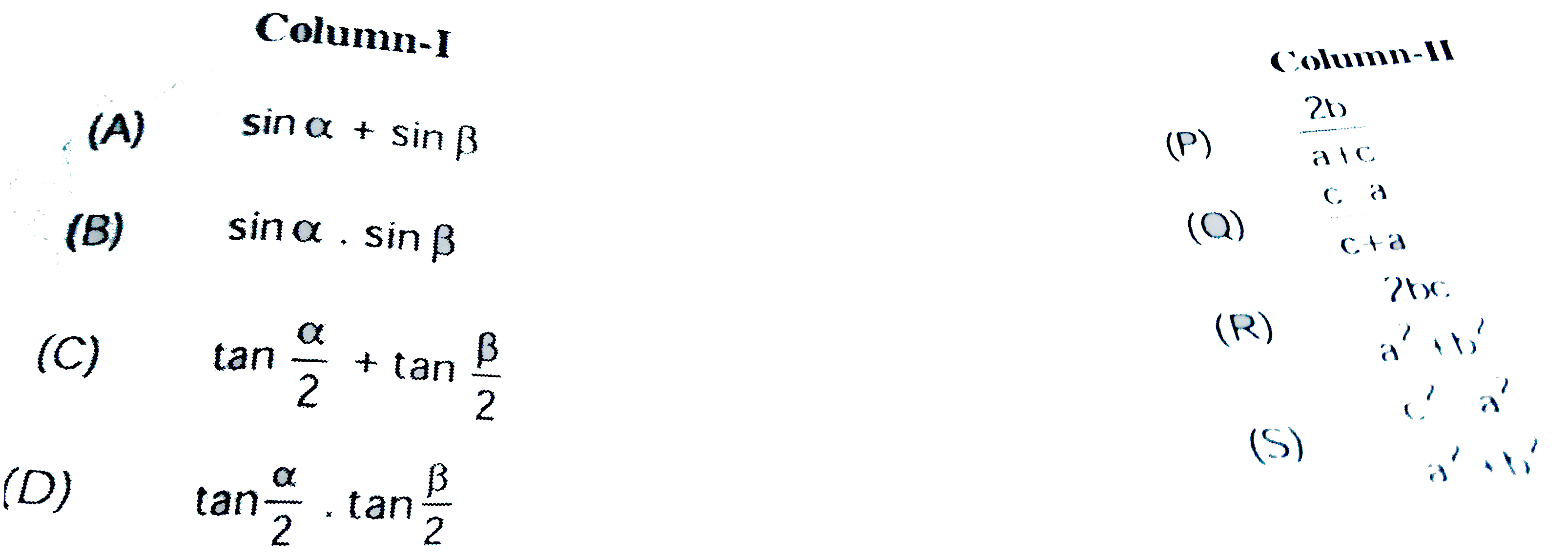Let α,β be two distinct roots of acosθ+bsinθ=c, where a, b and c are three real constants and θ∈[0,2π]. Then α+β is also a root of the same equation if Solution in Bengali
a+b=c
b+c=a
c+a=b
c=a
Step by step video & image solution for Let alpha,beta be two distinct roots of acostheta+bsintheta=c, where a, b and c are three real constants and thetain[0,2pi]. Then alpha+beta is also a root of the same equation if by Maths experts to help you in doubts & scoring excellent marks in Class 12 exams.
Updated on:21/07/2023Topper's Solved these Questions
Similar Questions
The number of solution(s) of the equation √x+1−√x−1=√4x−1 is/are
View SolutionIf the vertex of coinc y2−4y=4x−4a always lies between the straight lines , x+y=3 and 2x+2y−1=0 then
View SolutionLet α,β are the root of equation acosθ+bsinθ=c.
Which of the following is/are true.
View SolutionLet α,β are the root of equation acosθ+bsinθ=c.
If α=30∘ and β=60∘ such that a,b,c represent sides of a ΔABC then
View SolutionIf α and β are the roots of the equation, acosθ+bsinθ=c, then match the entries of column I with the entries of column- II

View SolutionIf αβ(α<β) are two distinct roots of the equation. ax2+bx+c=0, then
View SolutionLet a,b,c be real if ax2+bx+c=0 has two real roots α and β where a<−2 and β>2, then
View SolutionLet α,β the roots of the equation (x - a) (x - b) = c , c ≠ 0. Then the roots of the equation (x−α)x−β)+c=0 are :
View Solutionacosθ+bsinθ=c সমীকরণ α,β(α≠β) দ্বারা সিদ্ধ হলে tanα+β2 -এর মান হবে—
View SolutionLet α, β be the roots of the equation (x−a)(x−b)=c, c≠0, then the roots of the equation (x−α)(x−β)+c=0 are
View SolutionIf α and β are distinct roots of acosθ+bsinθ=c, prove that sin(α+β)=2aba2+b2
View SolutionIf αandβ are roots of the equation acosθ+bsinθ=c then prove that,
sin(α+β)=2aba2+b2
View Solutionमाना acosθ+bsinθ=c जहाँ a, b और c तीन वास्तविक अचर तथा θ∈[0,2π], के दो भिन्न मूल α,β है | तो α+β भी समान समीकरण का एक मूल है यदि
View SolutionLet α,β be two distinct roots of acosθ+bsinθ=c, where a, b and c are three real constants and θ∈[0,2π]. Then α+β is also a root of the same equation, if
View Solutionα,β হল acosθ+bsinθ=c সমীকরণের দুটি ভিন্ন বীজ, a,b,c তিনটি বাস্তব সংখ্যা এবং θ∈[0,2π] | সেক্ষেত্রে α+β ঐ সমীকরণের আরেকটি বীজ হবে যদি
View Solution
